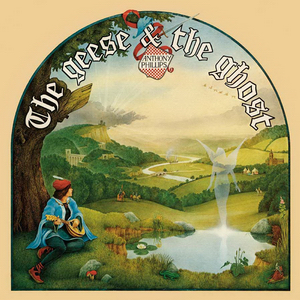 Because he left after the second album, and was replaced and eclipsed by the flashier Steve Hackett, Anthony Phillips is often overlooked in the Genesis story. This is unfair, because he was one of the founders of the band, and its first guitarist when Mike Rutherford concentrated on bass. But leave the band he did, and watched them from afar as they became, well, Genesis. Meanwhile, he studied classical music.
Because he left after the second album, and was replaced and eclipsed by the flashier Steve Hackett, Anthony Phillips is often overlooked in the Genesis story. This is unfair, because he was one of the founders of the band, and its first guitarist when Mike Rutherford concentrated on bass. But leave the band he did, and watched them from afar as they became, well, Genesis. Meanwhile, he studied classical music. Still, he stayed on good terms with his old schoolmates, particularly Rutherford, who was happy to help him develop ideas and co-write for what was supposed to be a full 50/50 collaboration, but would instead become Phillips’ first solo album. The Geese & The Ghost should already be of mild interest to Genesis fans, and even more so because Phil Collins sings lead on two songs. That said, much of the album is pastoral, classically influenced acoustic music, mostly played on stringed and other instruments by Phillips and Rutherford, not unlike how Mike Oldfield built Tubular Bells, which it resembles at times.
The opening “Wind: Tales” sets the scene for the first minute, fading in and out before “Which Way The Wind Blows”, sung by Phil over gently strummed and picked electrics, fitting right in with his earliest vocal appearances on Genesis records. The six-part “Henry: Portraits From Tudor Times” is a Rutherford collaboration that tries to pretend Rick Wakeman never happened for thirteen minutes. For the most part it’s pleasant and low-key, with oboes and flutes, but gets a little overwrought during the “Henry Goes To War” section, and “Triumphant Return” actually includes cannons and a chorale. “God If I Saw Her Now” is sung sweetly by one Viv McAuliffe, answered by Phil.
“Chinese Mushroom Cloud” is the barest acoustic duet, floating in and out before the 15-minute title suite. This is in two parts, separated by the organ blast eight minutes in, but the second half is also in unindexed segments. Throughout, classic and rock are blended. Phillips himself sings “Collections”, a somewhat maudlin but pretty piece accompanied by flutes and an orchestral arrangement. This flows seamlessly into “Sleepfall: The Geese Fly West”, a lovely finale that starts on just piano but slowly expands to a full sound, then out on flute and oboe playing a theme similar to where we started.
While some might find it too sweet, The Geese & The Ghost is a pleasing alternative to the more challenging solo albums other band members put out in the ‘70s, and certainly more rewarding than most of Mike + The Mechanics, and anything Tony Banks did on his own. It certainly helps that it sounds more like early Genesis, and in a good way. (Later reissues restored one of the parts to the “Henry” suite on the main disc, and included another with demos and basic tracks, plus another Collins vocal, this one for “Silver Song”, which was supposedly planned as a standalone single but didn’t happen.)
Anthony Phillips The Geese & The Ghost (1977)—3
Hey, you really liked “Dusk”? Well, here’s ¾ of an hour of it for you (with apologies to John McFerrin)!
ReplyDeleteWell, that’s an exaggeration, but not much of one. If you know that Phillips and Rutherford wrote that song, then this album is not going to be a big surprise. They created something unique – the only prog album centered around 12 string guitars.
Now, I like “Trespass” a lot more than most Genesis fans. From the beginning, I’ve always enjoyed every single track on it and can listen to it from beginning to end in one sitting. A big reason for that is the guitar sounds – but it’s not the ONLY reason.
This album is certainly a prog album, but it’s not much of a prog ROCK album. If you took this and “Trespass” in isolation, you might conclude that Banks and Gabriel were responsible for the rock dynamics in early Genesis. On “..Geese..”, you’ve got these long stretches with absolutely no rhythm section, not even light percussion. When it does come in, like on “Henry..”. it’s not all that noticeable. People who their prog with a lot a typical bombast and wanking are going to be bored stiff.
Given that, I like the beautiful atmosphere that the guys created here. The two lengthy track are mood pieces, but one can become engaged with them more than just background music. As for the vocal numbers..well, this is the guy who wrote “Let Us Now Make Love”, so the naivete of these lyrics isn’t shocking. However, the melodies and arrangements are simple, but pretty. Phil Collins and Viv McAulliffe sing them beautifully. They can be easily mistaken for lost outtakes from “A Trick of the Tail”, and that’s good.
So, this album will appeal to a certain niche of prog fandom. However, the delayed release doomed it. This still sounded quite a bit like the mellower aspects of the Genesis of “Wind and Wuthering”. There wasn’t any room for more than one of those. The fact that it sold over here at all is thanks to the diligence of Passport Records. They worked hard to promote their prog artists like Synergy, Shadowfax, and Anthony. Too tough of a sell. Today, if you’re in a mellow mood, it’s still a good listen, even if you don’t typically like prog.